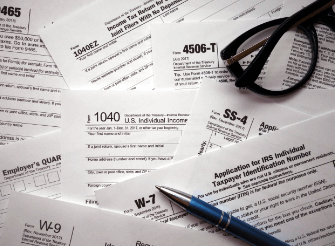Key Services
- Auditing and Accounting
- Business Services
- Canadian Taxation Services
- Corporate Tax Planning & Preparation
- Cross Border Trust and Estate Planning
- Financial Services
- Investing as an Expat or US Connected Person
- Investing in U.S. Real Estate from Outside the U.S.
- Payroll & Business Services
- US Corporate Taxes
- US Expat Taxation Services
- US Individual Taxes
- US Tax Resolution Services
US International Tax Accountant Services
Are you looking for an International Tax Accountant to help with US-Canada or Canada-US tax preparation?
A. A. Ali, CPA CA specializes in Canadian and American cross-border taxation. As a cross border tax accounting firm, we bring over 30 years of international tax expertise to our clients in Canada and the U.S. With offices in Toronto and New York City, we are ideally poised to help clients on either side of the border and are licensed to represent you in all states and provinces.
Effective tax preparation and planning can help minimize your future tax liability. A. A. Ali, CPA, CA is here to assist you in managing both your personal and business tax issues. We can help you understand future business opportunities and extrapolate and explain how these opportunities can impact your tax status and vice versa. Not all tax planning opportunities are apparent. With My Global Adviser, we ensure your benefit from these opportunities. We have the experience and understanding of how the local, state and federal tax legislation affects you and your business. We are constantly looking and identifying new ways to reduce liabilities at the local, state and federal level.
We have a comprehensive list of services to meet your needs:
- IRS Representation
- Tax Preparation and Planning
- IRS Certified Acceptance Agent (CAA)
- U.S Tax for Non-Residents Aliens (1040NR)
- U.S. Tax for citizens living outside the US
- Preparation of Forms 8288 and 8288A (FIRPTA)
- Accidental Americans Compliance Service
- FATCA reporting for foreign investors in the US (Form W-8BEN-E)
- FBAR/FinCEN
- EIN Application Process
- ITIN for foreign nationals (FORM W7)
- US Company formation-INC, LLC, Partnership
- Form 5471 Any U.S. citizen, corporation, partnership, trust, or estate who has at least 10% ownership in a foreign corporation, needs to file Form 5471.
- Form 1116 (Foreign Tax Credit)
- 2555 (Foreign Earned Income Exclusion)
- Form 8938 vs FBAR
- Formation of Incorporations - Myglobaladviser can assist you in the formation of any of the entities listed here, in any state of the US
- US Citizenship relinquishment (DS-4079)
- Renunciation (Form 8854 Expatriation]
- US tax reporting of foreign income, foreign assets, foreign businesses, foreign pension
- Social Security Treaty Claims
- American investors in passive foreign investment companies and mutual funds Form 8621
- Form 3520 Annual Return to Report Transactions with Foreign Trusts and Receipt of Certain Foreign Gifts
- GILTI Form 8992
- Streamlined Filing
- Form 965
Taxation - US
 The US is one of a few countries where taxes are based on citizenship regardless of physical residence and new legislation is in place that targets US citizens who have not been filing US tax returns.US tax rules also extend beyond US citizens to those foreign persons carrying on business in the US or holding US investments in real estate or stock of US corporations. Many Non-US persons are subject to US gift tax on certain real estate transactions and also subject to US death taxes on US property. In line with this, we have seasoned staff (CPA’s) in dealing with these issues. We prepare all forms of US Tax Returns including applications for ITIN.
The US is one of a few countries where taxes are based on citizenship regardless of physical residence and new legislation is in place that targets US citizens who have not been filing US tax returns.US tax rules also extend beyond US citizens to those foreign persons carrying on business in the US or holding US investments in real estate or stock of US corporations. Many Non-US persons are subject to US gift tax on certain real estate transactions and also subject to US death taxes on US property. In line with this, we have seasoned staff (CPA’s) in dealing with these issues. We prepare all forms of US Tax Returns including applications for ITIN.
Top Ten Ways to Avoid an Audit
It is an unfortunate fact of life that self-employed taxpayers are more likely to be audited by Revenue Canada. That's because we are easy targets since so many of us fail to keep proper records! To minimize your chances of going through this nightmare, follow these ten steps.
- File your return on time every year.
- Double-check your math. Don't make mistakes. The best way to accomplish this is to...
- Buy a computer program. These days, it doesn't make sense to do it by hand, unless you have the simplest of returns. A good program will notify you of errors, keep you up to date on recent tax changes, and even point out deductions you may be missing. If you don't have a computer, hire a professional.
- Declare all your income, especially if you are self-employed.
- Don't makeup deductions, especially if you are self-employed. Be honest. Revenue Canada has ways of computer cross-checking your claims.
- Don't e-file. OK, I have no facts or statistics to back this up, but my impression from talking to people inside the industry is that taxpayers who e-file are more likely to be audited. It seems logical. Have you ever prepared your own return, then taken it to an e-filer? Often they barely glance at the documents before sending the return off. These returns must have a high percentage of errors, and I'm sure Revenue Canada knows this and watches them carefully.
- I know this is a hard pill to swallow but earn less money. The more you make the greater the chance of an audit (you just pay more taxes anyway).
- Don't declare business losses year after year. Losses are OK for 2-3 years
- Filing a guilty-looking return will increase your chance of an audit. For example, if you have a large meal and entertainment deduction, it must be backed up with adequate documentation.
- Keep accurate records
Expat Taxation: US Citizens and Alien Residents living outside the United States
- FACTA Compliance, FBAR, Form 5471 (Small Business Owner), self-employed, streamlined procedure
- Form 8938
Tax Preparation & Planning
Effective tax preparation and planning can help minimize your future tax liability. My Global Adviser is here to assist you in managing both your personal and business tax issues. We can help you understand future business opportunities and extrapolate and explain how these opportunities can impact your tax status and vice versa. Not all tax planning opportunities are apparent. With My Global Adviser, we ensure your benefit from these opportunities. We have the experience and understanding of how the local, state and federal tax legislation affects you and your business. We are constantly looking and identifying new ways to reduce liabilities at the local, state and federal level.
Here are some of the ways we help:
- US tax reporting of foreign income, foreign assets, foreign businesses, foreign pension, Social Security Treaty Claims
- FATCA/FinCEN reporting for individuals (Form W-9, W-8BEN, W-8BENE FBAR, FinCEN 114)
- American investors in passive foreign investment companies and mutual funds (PFIC Form 8621)
- Nonresident alien tax return with 1042S/FIRPTA Tax Reclaim (NRA)
- Streamlined foreign offshore procedures (Form 14653)
- Dual-status returns and Nonresident returns (Form 1040NR)
- Accidental Americans Compliance Service
- US Citizenship relinquishment (DS-4079) or renunciation (Form 8854 Expatriation]
- FATCA classification for foreign investors in the US (Form W-8BEN-E)
- US tax ID issuance for foreign corporations
Taxation – Canada
Every business or investment decision has tax implications. We strive to minimize your tax burden through effective planning. We provide a variety of tax services designed to achieve this objective. This includes corporate, trust and personal.
Business owners need information that allows them to make decisions quickly. Our goal is to ensure that accurate, relevant information is available to our clients so that they make the right decisions.
The Canadian Income Tax Act uses residency status (not citizenship) to determine how the income should be taxed in Canada.
Subsection 2(1) of the Income Tax Act states:
"An Income Tax shall be paid… on the taxable income for each taxation year of every person resident in Canada at any time in the year.”
Canadian residents are taxed on their world income. While other countries may tax income on the basis of citizenship or domicile, the principal basis upon which the Income Tax Act of Canada imposes liability for income tax is residency.
- Canadian citizens living overseas reporting rental income, investment income and sale of a principal residence
1040NR (US Tax for Non-Resident)
A non-US person must report their income on Form 1040NR. These types of income can be rental income, investment income, partnership income (K1), Sale of property.
We can help you to obtain an ITIN Number (9 digit number like SSN). This firm is CAA Qualified.
CONSULT one of our professionals and we will make sure you are in compliance with the law.
If the individual is a dual citizen or not a citizen of either country, then CRA could be asked to determine the status of the individual. This could be done using the form “Determination of Residency Status” – NR74 E.
Case Study :
Rose is a U.S. citizen. she signed a five-year employment contract with Zellers. She moved to Canada on June 15th. She has a valid work permit for five years. She has the intention to apply for Canadian immigration. She is single. She lives in a rented apartment in Etobicoke. She owns an apartment in Orlando Florida that is still available for her own use. How should she file her taxes? Can she claim moving expenses?
Answer: In order to determine whether Rose is a Canadian resident, the following factors need to be considered:
- Physical Presence: Rose is present in Canada as of June 15th. However, the determination of residency requires more than physical presence. She is living in a rented apartment in Etobicoke. Even though she still has a home available for use in Orlando, she has been staying in Etobicoke since her arrival.
- Habitual Abode: She has been constantly present in Canada for work since June 15th. Her business interests have been in Etobicoke since June 15th.
- Social Connections: She goes to Church every weekend and socializes well with friends that she has made here. She also has some cousins whom she visits regularly. She doesn’t have much contact with any of her previous friends in Orlando.
- Nationality: Her being a U.S. citizen is only a determinative factor if nothing else proves her residency. But based on the above-mentioned information, we don’t need to go that far. Her Canadian residency can be proved based on other factors.
Implications of Canadian Residency
- She took Canadian residency as of June 15th. She would be a part-year resident.
- She has to declare her worldwide income starting June 15th.
- Her non-refundable credits will be prorated based on the number of days in Canada.
- Rose can’t claim moving expenses since she was a non-resident before the move.
- Rose also has to file a US tax return since she is a US citizen.
Please Contact Us
TORONTO
Suite 400 - 23 Westmore Dr.
Toronto, ON M9V 3Y7
OFFICE
416-213-1986
CELL
416-907-8505
FAX
888-893-1040
NEW YORK
Suite 903 - 576 Fifth Ave New York, NY 10036
OFFICE
212-687-2898
CELL
718-635-1991
FAX
888-893-1040
UK & THE EU
415 High Street 1st Floor Suite 450 London, E15 4QZ
OFFICE
+44 2036951800
